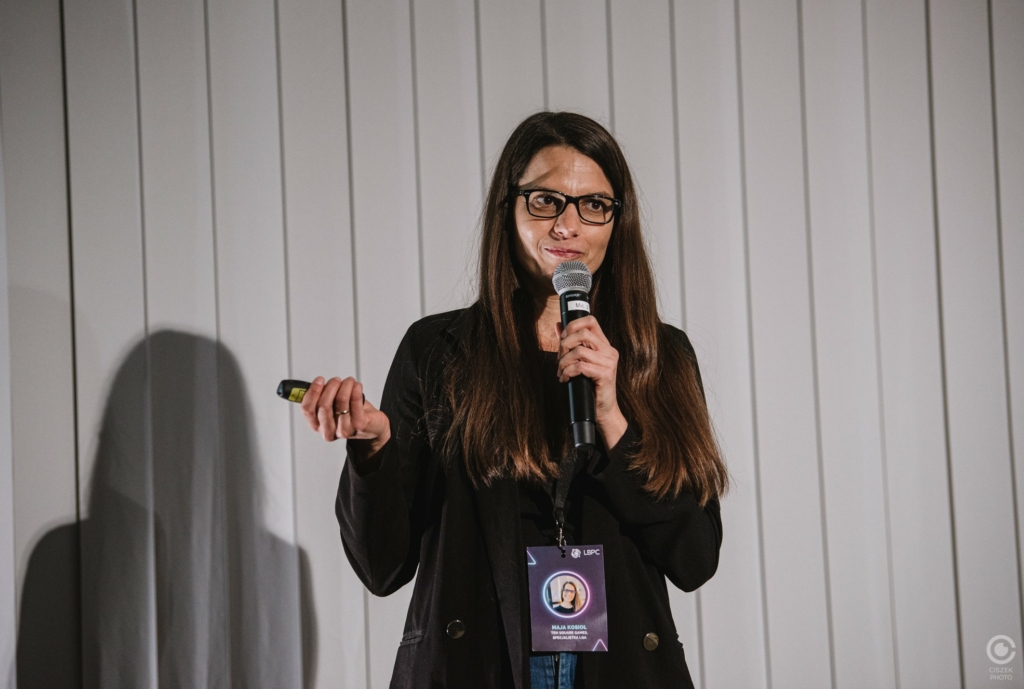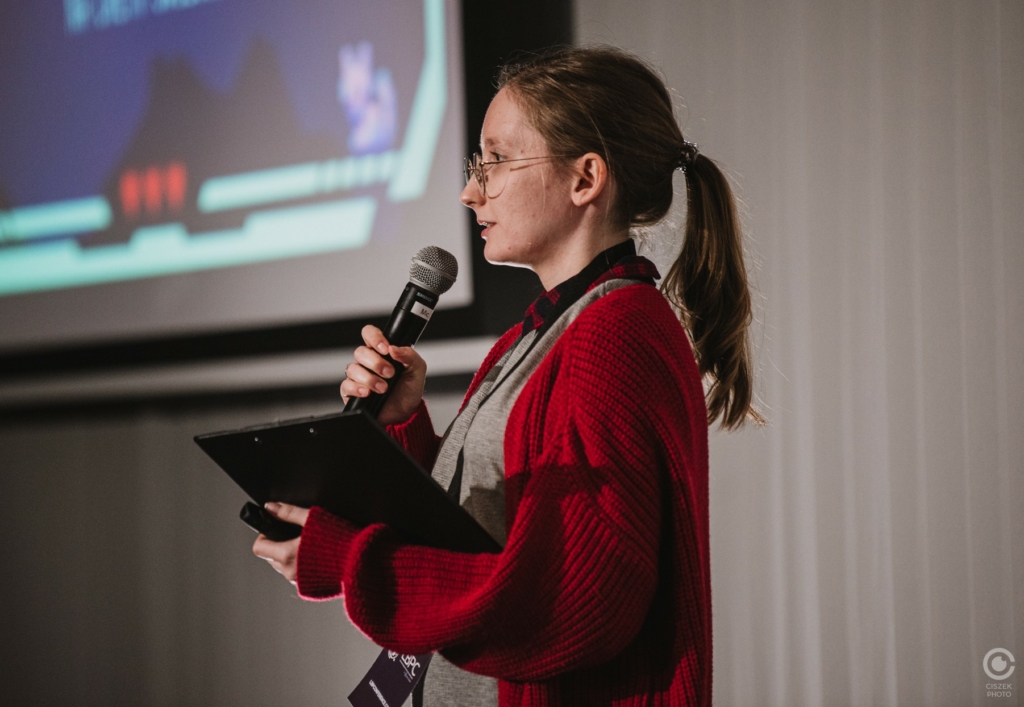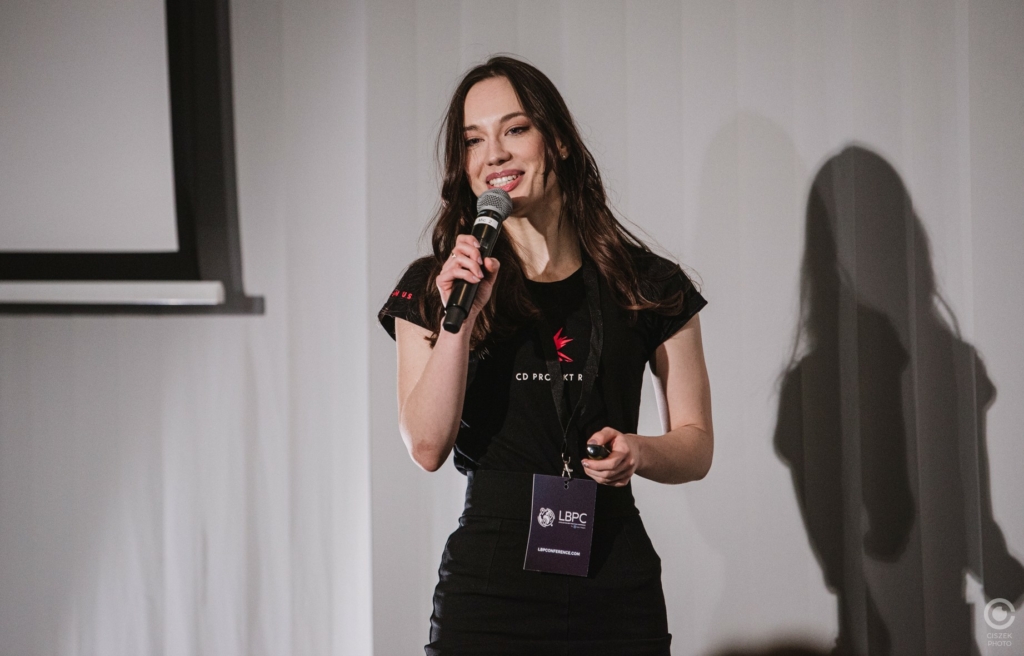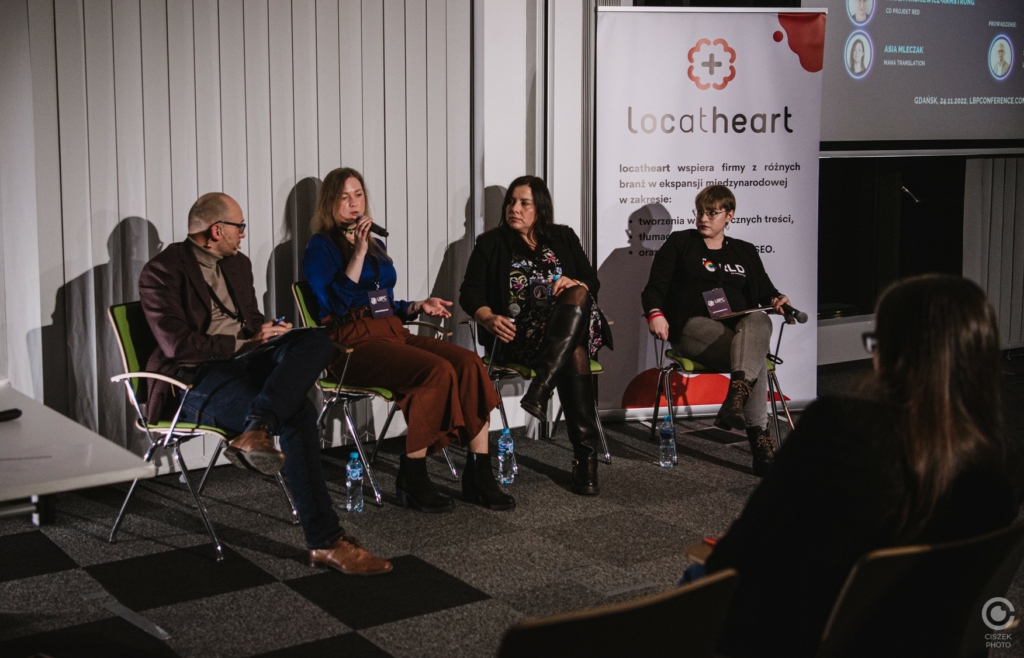
On 24 November 2022 at the Gdańsk Entrepreneurship Incubator STARTER, locatheart hosted the first conference dedicated to game localisation in Poland – the Localisation Best Practices Conference, or LBPC. The event’s goal was to present topics related to localisation and highlight its importance for the gaming industry, as proven by the global success of many Polish games, including The Witcher and Fishing Clash.
The conference was organised by locatheart, a translation agency specialising in localisation and content creation for dozens of markets. One of the company’s core activities is localisation of games – including board, card, mobile and video games. Sharing knowledge about it – as many people have yet to come across that topic – is of particular importance to our translation agency:
Localisation tends to be an underappreciated and sometimes even overlooked game development process. Game creators often disregard this field, but a poorly localised game can only cause frustration among players. Poland hasn’t yet seen a conference that would create an opportunity for representatives of the game localisation industry to meet and share their experience. I’m glad that speakers from the biggest and the most influential game developers – both nationally and globally – accepted our invitations to the first edition of the event.
Szymon Neubauer-Vasquez – CEO, locatheart
Crazy Room
Before the official part of the conference, the guests had the opportunity to visit the Crazy Room – furnished and decorated in the style of Alice in Wonderland, it hosted an exhibition of games translated and co-translated by locatheart: Oculus VR games and console games (which enjoyed the biggest popularity), as well as mobile, board and card games. The participants had the occasion to talk with those involved in the process of localisation of the presented games.
The busiest stand in the Crazy Room was the one with VR games. Many visitors lined up in the queue to try them out. Among our guests were many people from the industry: for example, students of linguistic courses from the University of Gdańsk, DTP experts, and professionals whose job is developing the games themselves. We were asked about our processes, how they differ depending on the client and how we manage to deliver translations into that many languages – whether our agency employs multiple polyglots. We held many good conversations and shared our experiences and observations.
Project Coordinator at locatheart
Presentation of the games localised by locatheart – which the guests could play – was an exceptionally important part of the agenda. Thanks to that, the participants could see for themselves how important good localisation is. And not only that – during informal chats with linguists and coordinators who carry out our translation projects, they were able to learn more about the complexities of localisation processes and factors that influence them, highlighting the conference’s main idea.

Official part
The official part of the conference was divided into two sections – three lectures, by Maja Kosioł from Ten Square Games, Kamila Puzdrowska from locatheart and Wiktoria Paciorek from CD PROJEKT RED, respectively; and a discussion panel with Ewa Dacko from Ten Square Games, Paula Mackiewicz-Armstrong from CD PROJEKT RED and Asia Mleczak from Mana Translation. The panel was moderated by Szymon Neubauer-Vasquez from locatheart.
Mobile game LQA
During her presentation, Maja Kosioł spoke about the LQA stage of mobile game localisation, how vital it is, and what the potential consequences of skipping it are. She explained how LQA is performed at Ten Square Games and what aspects of it are particularly emphasised. From her speech, we learned about the importance of promoting localisation values and LQA, communication and working on concrete data collected during project preparation.

3 pillars of successful localisation
The next speaker was Kamila Puzdrowska. She briefly explained what localisation actually is and the key factors required to achieve success in the process. According to Kamila’s presentation, the 3 mysterious pillars are: people, that is, linguists and project coordinators; tools which they use daily; and processes they implement as part of projects. Kamila also told everyone how translation projects are handled at locatheart, what difficulties they come with, and how to overcome the most common challenges – such as inconsistent use of terminology.

Localising the world of The Witcher and Cyberpunk – how it’s done at CD PROJEKT RED
Wiktoria Paciorek spoke about the localisation process at CD PROJEKT RED, with particular emphasis on games such as The Witcher and Cyberpunk 2077. She also presented different language versions of songs from these hits, demonstrating the artistic value of localisation and linguists’ contribution to the sharing of emotions. Finally, she noted that while not everyone attaches significance to localisation, positive reactions of players are paramount for the creative process and provide motivation for further work.

Localisation in game development and distribution
As the panel’s name suggests, the participants talked about localisation and its role in game development and distribution. They mentioned the most interesting and amusing anecdotes relating to translation of different content into new languages and shared some details about their respective companies’ processes.
Ewa Dacko (Ten Square Games) emphasised that localisation is not only about giving gamers a seamless experience but also providing accessibility. By making games available in multiple languages, developers open doors to diverse markets, allowing players from various regions to comfortably engage with the content. This inclusivity fosters a stronger connection between the players and the game, ultimately contributing to a more positive gaming experience.
As Dacko said, “[Localisation] is all about giving gamers – anyone who ends up touching our games and wants to have fun playing them – an experience they count on.” Only a handful of gamers would be willing to play a game ridden with bugs, and even for those few, it likely wouldn’t take long to set it aside and regret investing their hard-earned money in such a flawed experience. That’s why testing is such a crucial part of game development – and one would expect the same level of diligence in localisation testing, but unfortunately, the reality is quite different.
A lack of awareness about localisation processes can lead to unfavourable treatment of translation teams, as experienced by Asia Mleczak (Mana Translation) who had to deal with a legacy translation of a game series she and her team worked on. Players demanded that certain terms remain untranslated, unaware that the localisation team had no control over those decisions. This highlights the need for educating players and the gaming community about the intricacies of localisation to foster appreciation for the efforts made by the localisation teams.
With the increasing automation of game dev, some developers rely on machine-generated translation for efficiency and cost optimisation. However, due to a lack of broader context – or, in some cases, any context at all – this approach often leads to grammatical errors and cultural misunderstandings, especially for languages that differ significantly from English.
Asia Mleczak (Mana Translation) pointed out a common practice – using automatic tags, e.g. [adjective] silver [noun] knight. While it may work well in English, a language that lacks gendered nouns or declension classes, it can create significant issues in languages like Polish, where adjectives and nouns cannot be automatically combined.
This is where linguistic quality assurance (LQA) becomes crucial. LQA involves thorough testing and validation of localised content to ensure linguistic correctness and cultural appropriateness. Neglecting LQA can result in problematic game mechanics and damage the reputation of both the developers and the game itself. And on the other hand, by investing in LQA, developers can deliver high-quality localised games, leading to enhanced player satisfaction and broader market reach.
Still, different gaming markets have different expectations when it comes to localisation. Szymon Neubauer-Vasquez (locatheart) pointed out that players, particularly in countries like Poland, pay great attention to localisation quality and are quick to vocalise any mistakes they find. Ewa Dacko added that some markets, such as Korea, Japan, and Scandinavia, are known for being exceptionally demanding, half-jokingly remarking that “if Korean players rate [a game] 4/5, then it’s like European players rating it 5/5”. Players in these regions have higher expectations, and even minor linguistic flaws or unnatural expressions can lead to disappointment and potential loss of player engagement.
Paula Mackiewicz-Armstrong (CD PROJEKT RED) further illustrated the challenges encountered during the process of localising games – especially ones that carry culture-specific references, such as the proudly Slavic The Witcher. Adapting concepts such as drowners, noonwraiths, and nightwraiths for distant markets like Japan, China, and Korea requires extensive effort to ensure cultural understanding and player immersion.

At the end of the day, it all pays off and localisation becomes a powerful communication strategy. More and more developers are reaching out to gaming communities in their native tongue through localised social media content, press releases, and advertisements. Recognising its business advantages, game developers actively embrace localisation to reach wider audiences and boost sales and revenue.
To this day, many people don’t realise that localisation goes together with marketing. Releasing a game in specific language allows game developers to participate in local events – this enhanced visibility extends beyond gaming-related media and spills over into mainstream media, leading to increased attention and engagement.
Paula Mackiewicz-Armstrong emphasised that markets with limited access to localised games exhibit tremendous enthusiasm when presented with content catered to their language and culture. The appreciation for linguistic elements fosters a highly involved community of players. To exemplify the impact of language representation, she mentioned the case of Cyberpunk, where Creole characters were voiced in Creole, rather than English. This decision resonated with the Creole-speaking community, creating a sense of familiarity and belonging in the game world.
Summary
Without a doubt, the conference was a success and achieved its main goal – it shed light on the issue of localisation and its different aspects. All co-creators of the program pointed out how crucial – indispensable, even – localisation is and warned of scenarios that can come true if it’s skipped or done at the last minute.
That’s because localisation is important not only in the context of game development but also gamers’ reception of a product. If localisation is solid, it pays off in terms of players’ positive emotions connected with gaming. When preparing different language versions of games, it is worth paying attention to the way in which cultural differences between markets can impact a game’s reception, as well as to what could be modified in order to include local flavors. Such Easter eggs are one of the biggest factors influencing people’s opinion of a game.
Want to take your game to another level?
Photos: Ciszek Photo
